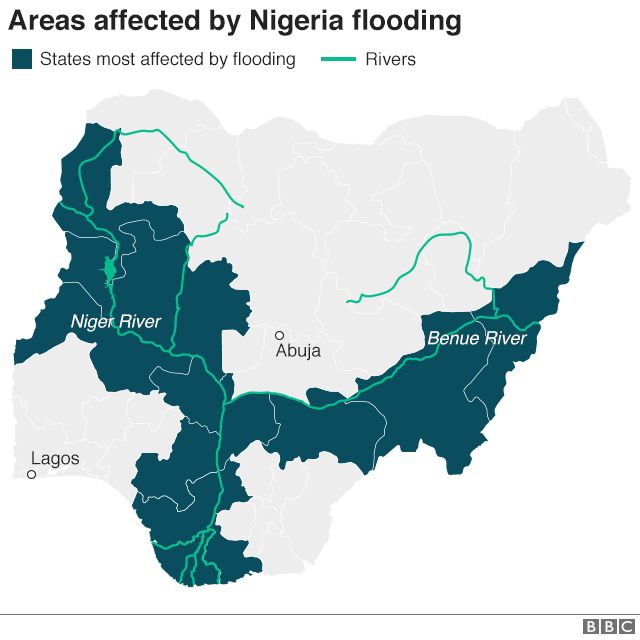Kaduna: Various Federal and state agencies in Kaduna, Kano, and Katsina states are ramping up efforts to mitigate flooding through various projects.
They do this through a myriad of plausible efforts like stormwater drainage management, riverbank protection, and shoring up climate resilience initiatives. These efforts aim to prevent or reduce flood impact, but challenges persist, with recent floods causing destruction, displacement, and loss of lives across Nigeria.
The Nigerian Meteorological Agency (NIMET) has since released its 2025 flood forecast predicting likely flood disasters across the nation, including the three states. It had also preferred some precautionary measures, including clearing drainage systems, relocating residents, and constructing flood barriers, among others.
In Kaduna, the state government, in collaboration with federal agencies and development partners, has ramped up preparedness efforts to mitigate the impact of projected heavy rains and potential flooding across the state.
Mr Usman Mazadu, Executive Secretary of the Kaduna State Emergency Management Agency (KADSEMA), said the state had activated its 2025 Flood Emergency Operation and Response Strategic Team, alongside a fully equipped Emergency Coordination Centre.
He said, “We have also set up seven Safe Haven Centres in high-risk LGAs such as Chikun, Kachia, Soba, and parts of Kaduna metropolis.” Mazadu said the centres were stocked with tents, food and non-food items, and basic medical supplies, to serve as temporary shelters in the event of displacement.
“Our teams and volunteers are on the ground across all 23 LGAs to clear blocked drainages, sensitise residents, and support local disaster committees,” he added. Mazadu also confirmed that the state had updated its 2022 Flood Risk Map and Contingency Plan, in line with fresh forecasts by the Nigerian Meteorological Agency (NiMet).
“We’re also working with UNICEF to support over 5,000 vulnerable households with cash assistance to enable voluntary relocation from high-risk zones,” he said. At the Kaduna Zonal Office of NEMA, the Head of Operations, Sulaiman Muhammad, said the federal agency had pre-positioned emergency relief items and deployed search-and-rescue teams across strategic locations.
“Our focus is on early warning and grassroots preparedness. We are engaging traditional institutions, youth groups, and religious leaders to drive community-level sensitisation as part of our 2025 National Preparedness and Response Campaign,” Muhammad said.
In a similar move, the Kaduna State Ministry of Environment said it had commenced dredging and clearing of waterways in flood-prone areas, including Barnawa, Kigo Road, Bashama Road, and Ungwan Rimi.
The Commissioner for Environment, Malam Abubakar Balarabe, said notices had been issued to residents in low-lying areas, warning them to relocate ahead of peak rains.
“KEPA has intensified enforcement of sanitation laws to ensure drainages remain unblocked,” Balarabe said.Hadiza Halid, the State Coordinator of ACReSAL, said the World Bank-supported project was addressing the root causes of flooding through catchment protection and landscape restoration.
“We are constructing mini-dams, reclaiming gullies, and planting trees to reduce runoff and build long-term ecosystem resilience. Emergency response is important, but we must also address the structural drivers of flooding,” she said. NiMet had earlier warned of a high probability of flash floods in parts of Kaduna, including Chikun, Igabi, Jema’a, Zaria, and Soba LGAs.
Officials expressed confidence that the coordinated response would minimise risks and enhance resilience as the rainy season peaks. In Kano, the State Emergency Management Agency (SEMA) said it has developed comprehensive strategies and an emergency response plan to mitigate flooding across the state.
The Executive Secretary of the agency, Isyaku Abdullahi-Kubarachi, disclosed this in an interview in Kano.
He said a high-powered committee, chaired by the state Deputy Governor, Alhaji Aminu Abdussalam, was set up to oversee the desilting of drainages across the 44 local government areas of the state. According to him, the initiative had significantly reduced flooding in Kano in 2024.
He said the state government had also organised several stakeholders’ engagements on disaster risk management and flood mitigation to enhance coordination, synergy, and response during emergencies.
“The agency has met with relevant stakeholders, including Local Emergency Management Committees, NGOs, and CSOs, to ensure flooding is reduced to the barest minimum,” he said.
Abdullahi-Kubarachi said SEMA had embarked on sensitisation campaigns across radio, television, markets, Emirate Councils, and communities to encourage residents to clear waterways and reduce flood risks.
He added that the agency had prepared temporary shelters for Internally Displaced Persons (IDPs) ahead of any emergency. The executive Secretary said the state government would continue to collaborate with the National Emergency Management Agency (NEMA) to address flood-related challenges and safeguard lives and property.
He urged the public to adhere to safety guidelines and avoid actions that could expose them to disasters, noting that such incidents could lead to economic hardship, loss of lives, and destruction of property.
He commended Gov. Abba Yusuf for his proactive approach to disaster risk reduction and his continued support for emergency management efforts in the state.
“Prevention, mitigation, preparedness, response, and recovery—as well as support for victims—remain central to our mission,” he added. The National Emergency Management Agency (NEMA) Kano Territorial Co-ordinator, Dr Nura Abdullahi, affirmed the agency’s unwavering support in advancing disaster preparedness, mitigation, and response efforts.
“We engaged critical stakeholders to enhance synergy, effective coordination and response during emergencies in Kano State and public sensitisation on solid waste management,” he said.
He emphasised the need to collaborate with stakeholders to reduce community vulnerability to various hazards, noting that failing to take swift, appropriate action can often escalate emergencies.
According to him, NEMA Director-General Zubaida Umar led a Proactive Disaster Preparedness Simulation exercise in Kano to enhance preparedness and coordination in the face of potential disasters.
He called on the general public to desist from indiscriminate dumping of waste on drains, clear blocked waterways, and adhere to building codes and environmental regulations.
He reiterated the agency’s commitment to the protection of the lives and property of the people in the state.The Commissioner for Environment and Climate Change, Dr Dahir Hashim, said that the state government has commenced its annual drainage clearance exercise aimed at curbing flooding as the rainy season sets in.
He said the initiative was part of the state’s proactive approach to addressing urban flooding and enhancing environmental sustainability. “This is not just another government activity. It reflects our commitment to proactive environmental governance and urban resilience,” he said.
Hashim said the desilting had been institutionalised as an annual calendar event by the ministry, with waste being evacuated promptly to prevent drainage blockages. He stated that the Baban Gwari Roundabout, a critical junction in the Jakara–Kwarin Gogau stormwater system, would be upgraded with modern infrastructure to address perennial flooding and improve traffic flow.
The commissioner commended Gov. Abba Yusuf for approving the formalisation of the desilting exercise and rehabilitation of key infrastructure in flood-prone areas.
He appealed to residents to desist from indiscriminate waste disposal and to report blocked drainage systems to the relevant authorities.
“The government will do its part, but citizens must also take responsibility. Sustainable environmental management requires collective effort,” he said. Hashim disclosed that while there was no current partnership with federal agencies, the state government had begun early interventions ahead of the peak of the rainy season.
He added that the government had made progress in reducing roadside refuse dumping, attributing this to ongoing sensitisation campaigns. “Enforcement of the environmental pollution control law will commence after the eight-week sensitisation campaign, which is now in its sixth week,” he said.
He also hinted at plans to privatise the state’s waste management system under a circular economy framework, while avoiding mistakes from previous efforts. In Katsina, the state government, through its Emergency Management Agency (SEMA), had spent more than N451 million to assist about 1,064 flood victims in the state in 2024.
Gov. Dikko Radda disclosed this on July 23, while receiving a donation from the National Emergency Management Agency (NEMA). The Secretary represented Radda to the State Government (SSG), Alhaji Abdullahi Garba-Faskari.
According to the governor, some of the victims received N300,000 each, while others got N600,000 each, and 3,196 victims received building materials valued at more than N180 million.
He added that food and non-food items worth over N207 million were purchased recently by SEMA, in case of any unforeseen
Disaster.
The governor further revealed that additional funds would soon be released to the agency for the purchase of building materials for flood victims. “From 2023-2025, the state government has purchased grains worth over N507 million and building materials worth N358 million, which were distributed to people affected by disasters,” he said.
NEMA, through its Director-General, Hajiya Zubaida Umar, had donated relief materials to victims of bandits’ attacks in the six most affected Local Government Areas.




